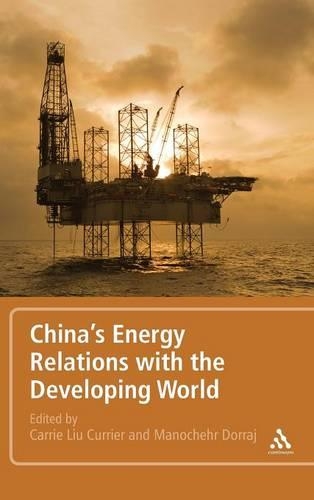
China's Energy Relations with the Developing World
(Hardback)
Available Formats
Publishing Details
China's Energy Relations with the Developing World
By (Author) Carrie Liu Currier
Edited by Manochehr Dorraj
Continuum Publishing Corporation
Continuum Publishing Corporation
24th March 2011
United States
Classifications
Tertiary Education
Non Fiction
Comparative politics
Globalization
327.5101724
Physical Properties
Hardback
240
Description
Reviews
"This book offers a variety of excellent essays that cover many new developments in China's quest for energy security, its energy strategies, and its interactions abroad in the developing world, with regional coverage of Middle East, Central Asia, Africa, and Latin America as playing fields, and country coverage of China, Russia, the United States, Japan, and India as key players in those regions. This book is a must for energy policy analysts and scholars dealing with China's foreign policy behavior in the developing world. The insights offered by the authors would be invaluable for understanding China's quest for energy security abroad."Sujian Guo, Professor of Political Science and Director of Center for US-China Policy Studies at San Francisco State University
Many commentators have grappled with the strategic implications of China's resource drive in the developing world. Few however have done this as eloquently and thoughtfully as the contributors to the volume edited by Currier and Dorraj. It offers a wealth of solid knowledge and sharp insights into the evolution, patterns, and practices of China's pursuit of energy security. Apart from examining rigorously the history, regional contexts, and prospective trajectories of Beijing's global outlook, the collection provides a revealing and pioneering engagement with China's own unique juncture between the developing and developed worlds. In this setting, while provocatively contending that energy security is an ongoing quest rather than an attainable end-state, the volume offers a much-needed reconsideration of the conceptual and policy outlines of China's emerging international agency. The analysis of Beijing's increasing interest and investment in the developing world demonstrates that the dominant Western view of China as either a friend or a foe obscures the nuances of what is ultimately a much more complex Chinese involvement in the dynamics of global politics. Thus, to the buffs of Chinese foreign policy, the volume edited by Currier and Dorraj offers a superbly researched account of both the analytical and empirical engagement with Beijing's international agency. To the neophytes, it makes available a rarely comprehensive glimpse into China's energy relations with the developing world. It is expected therefore that the scope and depth of the volume will be invaluable for the purposes of both teaching and further analysis of the ongoing transformations in global life as a result of increasing prominence of China's external outreach. - Emilian Kavalski - Lecturer in Politics and International Relations School of Humanities and Languages/ Centre for Citizenship and Public Policy University of Western Sydney -- Emilian Kavalski
"The book impresses by its breadth of regional coverage and wealth of details on foreign relations centered on China's energy policy and oil and gas investments abroad. Informed by theories of international relations and energy economics, the chapter contributors provide interpretative overviews of the recent diplomatic entanglements of insatiable Chinese energy demand and foreign oil producers who are more than willing to feed it.The chapters focusing on growing Chinese economic relations in the Middle East, Central Asia and Africa make a particularly strong impact, in carefully qualifying the conventional state-centric perspective on energy security with considerations of market trends, technological shocks, linkages to environmental and trade issues, and interstate dynamics that define the window of opportunity for China's shifting international energy supply and asset portfolios. The authors provide a useful reminder that China's economic relationships with India, Japan, and Russia cannot be reduced to a simple characterization of competition or cooperation. Elsewhere in developing countries where Chinese leaders have cultivated tremendous goodwill, aid and foreign direct investment, we need to be keenly aware of the hidden risks and fluidity in these contingent partnerships.More generally, policymakers should be advised to consider the question of whether the interests of various domestic and international stakeholders in China's economic expansionism could be brought into alignment through a carefully crafted series of mutually beneficial home-host country relations. Scholars wishing to contribute to an important and underdeveloped research agenda and business persons seeking to deepen their global vision of China's energy needs will be well served by this volume." - Dr Kun-Chin Lin, Lecturer, King's China Institute, King's College London
[the book is] highly accessible while remaining informative as well as nuanced in [its] analysis. -- International Affairs
Author Bio
Carrie Liu Currier is Associate Professor of Political Science and Director of Asian Studies at Texas Christian University. Her research interests are focused on China's economic reform policies to understand how developing countries are adapting to the demands of globalization. Her publications include several articles in the American Journal of Chinese Studies, Journal of Chinese Political Science, Politics and Policy.
Manochehr Dorraj is Professor of Political Science at Texas Christian University where he teaches courses on International Relations, Globalization, Politics of Developing Nations, and the Politics of the Middle East and North Africa. He has published extensively on Third World and Middle East development issues and their foreign relations.
